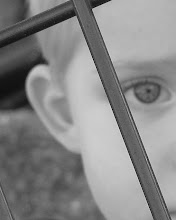How does one express and feel happiness?
The answer to this is happiness is expressed in a myriad of ways and differs according to each individual. However, I think I'd be safe in saying that the universal sign of happiness is a smile.
Individuals with autism spectrum disorders have an extremely hard time reading nonverbal social cues, including facial expressions. This is something we've been working on extensively with Little Guy, trying to improve his ability to recognize what emotions are "written" on another person's face.
Unfortunately, I've recently discovered our plan has backfired - Little Guy now believes that a person is only happy if they're smiling. In other words, if a person isn't smiling, they're not happy.
This has created some issues, especially with his friends.
We recently had one little boy over to play. This child is naturally sober and doesn't tend to smile often. Little Guy happened to pick that day to be focused on the "smile to show me you're happy" mode, and the results were disastrous.
Within five minutes of playing, Little Guy asked his friend why he wasn't happy. The friend tried to explain he was happy, to which Little Guy asked him why he wasn't smiling. Over the course of the next several minutes, I heard Little Guy repeatedly asking his guest "why aren't you smiling" and say "please smile and show me you're happy." I could feel the other child's frustration rising; even if he was happy to begin with (which I'm sure he was), that emotion had quickly fled under the demands that he produce a smile to prove it to his friend.
I took Little Guy aside and said he was bothering his friend by constantly demanding he smile. My son grew confused and sadly said, "I just want him to be happy." I tried to explain that just because a person isn't smiling doesn't mean they're not happy and told him to stop asking his friend to smile. My intervention helped the situation for a few minutes, then incredibly I heard Little Guy start in again. I quickly reminded him of our conversation, to which he replied "Oh, yeah" and then stopped asking his friend to smile. It took a few more reminders before my son finally quit pestering his poor friend, and we were finally able to enjoy the last few minutes of the play date.
I know my son will eventually grasp this concept with time, work, and practice. I just hope for patience on my end as I guide him through this, and that his buddies will also be patient with him as he tries to improve his social skills.
Sunday, April 15, 2012
Subscribe to:
Post Comments (Atom)



1 comment:
This is a great story! So true to the literal thinking that is so prevalent in ASD.
Post a Comment